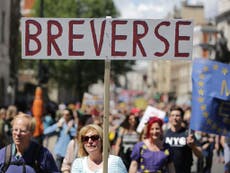It turns out that companies don't do better when bosses have very high pay – but this will have to change after Brexit
Inequality was highlighted by the shock Brexit vote – and figures are showing that executive pay is often a reward for sheer luck rather than the superlative skill and management expertise that we hear so much about


If top executive pay at big companies listed on the stock market was the racket that many hold it up to be, what would we expect to see in the data?
We’d probably expect to see a pretty tenuous relationship between companies’ share price performances and the rewards of those at the top of them. We’d also probably expect to see a one-way ratchet, where pay goes up in good times for a company, but rarely falls in bad times. We probably expect to see executives quite often rewarded for luck, rather than skill.
And guess what? Those things are precisely what the latest data does suggest. The financial data firm MSCI has taken a sample of 428 large listed American companies and examined their performance between 2006 and 2015. And MSCI has found that shareholder returns at those firms whose boss earned below the median of their sector outperformed those firms whose boss earned above the median.
“Companies with lower total summary CEO pay levels more consistently displayed higher long-term investment returns” the authors concluded. In other words, this appears to be big pay for not for performance, but for underperformance.
Brian Bell and John Van Reenen of the London School of Economics’ Centre for Economic Performance have carried out a similar exercise looking at top bosses’ pay at 500 large listed UK companies between 1999 and 2014.
Unlike in the MSCI study, the two researchers did find that executive pay was correlated with stock market performance over the period. Yet Bell and Van Reenen also found pay at the top is much more sensitive to increases in a company’s share price performance than decreases. In other words, bosses get very well rewarded in good times, but don’t suffer much in bad times, despite the supposed variability of top-level remuneration.
Bell and Van Reenen also show that executive pay is highly influenced by “random positive shocks” on an industry. In other words, executive pay is often a reward for sheer luck rather than the superlative skill and management expertise that we hear so much about.
We had confirmation last week from the Institute for Fiscal Studies that income inequality across the broad income distribution has been broadly flat since the financial crisis, indeed pretty level for the past 25 years. And yet most people have the sense that income inequality has been rising fast over that time.
The source of the discrepancy of perception lies in what we mean by income inequality. These days it’s not the gap between the top 10 per cent of families and those in the middle and the bottom that people are referring to when they complain about income inequality, but the gap between the top one per cent and the rest of us.
And the latest statistics show that trends here have been much less benign than those headline figures. The income share of the top one per cent rose from three per cent in 1980 steadily up to 8.7 per cent in 2009-10. It did dip to 7.1 per cent after the financial crisis, but the share has now bounced back to 7.9 per cent.
The idea that this growing one per cent inequality is driven by rewards for buccaneering entrepreneurs and risk-taking innovators benefiting from an increasingly globalised market for goods and services is a myth. This trend is, in considerable part, a story of rising compensation for people who work in finance and also this tiny privileged group of corporate executives.
Assuaging the popular anger over inequality, which was arguably highlighted by the shock Brexit vote last month, will require cutting finance down to size and doing something to rein in excessive and unmerited rewards for company bosses.
In truth, this is an argument that has pretty much been won. On the battlefields of economic theory, empirical evidence and also in the struggle for the centre-ground of politics there is little serious opposition any longer to the idea that pay at the top has become a racket.
In a speech before being installed as prime minister, Theresa May noted that the FTSE 100 is trading at about the same level as it was eighteen years ago “yet in the same time period executive pay has more than trebled and there is an irrational, unhealthy and growing gap between what these companies pay their workers and what they pay their bosses.”
May said she wanted UK companies to publish pay multiples between executives and median employees, for firms to hold annual binding shareholder votes on bosses’ proposed remuneration packages and to put workers on company boards to improve corporate governance on all matters, including pay at the top. These are all sensible and incremental reforms.
She lacks a personal mandate from the electorate as Prime Minister and the Brexit negotiations with the EU could well test her government to destruction in the coming years. But May has the political space, the popular backing and the statistical evidence base she needs to push through this particular agenda.
The market has failed. The time is ripe for the state to be bolder in curbing runaway pay at the summit of large companies.



Join our commenting forum
Join thought-provoking conversations, follow other Independent readers and see their replies